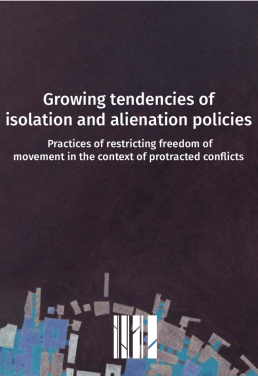The purpose of the study is to analyze the legal and political dimensions of the implementation of freedom of movement in the context of protracted conflict and to offer the state, international organizations and other actors alternative visions and recommendations to protect the rights and interests of the conflict-affected population. The study demonstrates the political and legal reality in which different conflict-affected groups have to move between controlled and uncontrolled areas, or abroad. The study presents the impact of unresolved conflicts, isolationist policies and restrictive regimes of movement on the realization of the rights of different conflict-affected communities and on intercommunal relations. For that purposes, the following groups are examined: IDPs, the population living in the Georgia-controlled territory, nearby the dividing line; Population living in conflict regions - Abkhazia and Tskhinvali region and ethnically Georgian population living in the same regions (Gali and Akhalgori population).
The study presents an analysis of international standards of freedom of movement and the experience of other countries in similar contexts. The recommendations presented in the study are based on the local context and positive international experience.
Several research methods have been employed throughout the study, encompassing:
- Desk research. As part of desk research, we examined open and credible sources that provide insights into the current conditions within conflict regions. These sources included recent reports and studies from local human rights advocates and international organizations, as well as media coverage.
- Examination of international legal standards, primarily drawing from pertinent rulings of the European Court of Human Rights.
- Interviews and fieldwork: Interviews and fieldwork were conducted by a team of researchers, based on a pre-designed questionnaire to facilitate in-depth discussions with diverse groups affected by the conflict. This involved conducting interviews and focus groups, as well as visiting villages situated near the dividing line. Field research took place from May to August 2023. Due to existing constraints, direct visits to conflict regions for face-to-face interviews were not feasible. Nevertheless, remote interviews were conducted with respondents from Abkhazia (4 interviews) and the Tskhinvali region (3 interviews), who had temporarily relocated to Georgia's controlled territory for various reasons (their places of origin included Gali, Tkvarcheli, Tskhinvali, and Akhalgori). Local contacts, particularly individuals from conflict zones (2 from Sokhumi, 1 from Ochamchire, and 1 from Tskhinvali), provided valuable insights and information regarding movement-related issues. Researchers also engaged with displaced and conflict-affected populations in 16 villages near the dividing line, including locations such as - Zugdidi Municipality: Ganmukhuri, Shamgona, Khurcha, Akhali Abastumani; Tsalenjikha Municipality: Pakhulani, Tskoushi, Muzhava, Potkho-Epseri; Gori Municipality: Ergneti, Nikozi, Gugutiantkari, Koshka, Zardiantkari, Kirbali, Mejvriskhevi, and Patara Khurvaleti (Bobnevi). In total, 29 in-depth interviews have been conducted with residents from these villages - including 7 internally displaced persons. Additionally, 3 interviews have been held with individuals employed in various professions in conflict regions, notably in Abkhazia, who have maintained close ties with the rest of Georgia. During these interviews, the following topics were explored: 1. Documentation and procedure required for movement 2. Opportunities and challenges for international travel for individuals residing in conflict areas 3. Functionality of checkpoints. 4. Security, illegal kidnappings and detentions, and 5. the enduring repercussions of borderization.
- Field visits to active and defunct checkpoints and observational research. Visits were conducted to nearly all operational and decommissioned checkpoints, where observations and on-site interviews with the local population took place. Notably, interviews were conducted directly on the Enguri Bridge, a bustling passage for citizens moving in both directions. Throughout this endeavor, a total of 43 respondents were interviewed, comprising 14 men and 29 women, traveling towards Abkhazia a nd Tskhinvali/South Ossetia.
- Expert Interviews: Throughout the preparation of the report, we conducted in-depth interviews with human rights defenders and experts who have been working with conflict-affected populations for many years and are actively involved in peace processes. A total of 7 interviews were conducted for this purpose.
- Analysis of Public Information from State Agencies: In the process of compiling the report, we also analyzed public information and statistics provided by state agencies, including the Office of the Minister of State for Reconciliation and Civil Equality, the Ministry of Internal Affairs, the State Security Service, the Ministry of IDPs from the Occupied Territories, Labor, Health and Social Protection, the International Education Center, Service Development Agency, and the Supreme Court of Georgia. However, obtaining public information from state agencies posed significant challenges, which made it difficult for us to verify certain data.
Freedom_of_Movement_-_ENG_1715157328.pdf

